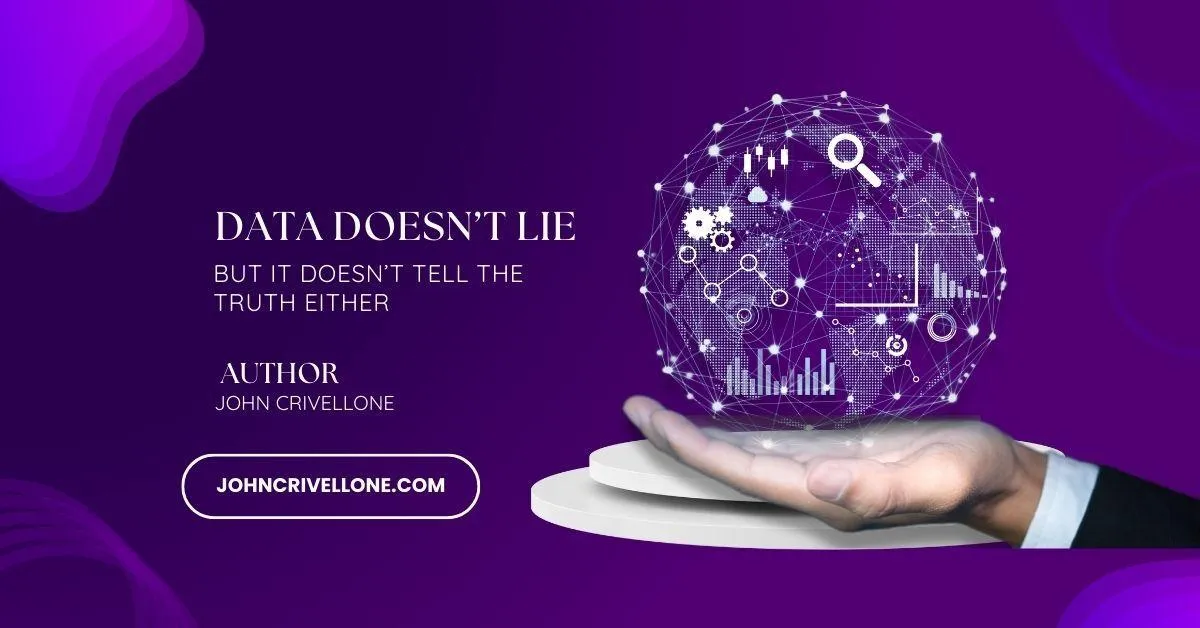
Data Doesn’t Lie… But It Doesn’t Tell the Truth Either By Jack Crivalle
In our world obsessed with numbers, metrics, and "truth" by algorithm, there’s a dangerous myth making the rounds:
"The data doesn't lie."
Sounds convincing, right? But here’s the reality check no one wants to admit: Data might not lie, but it sure as hell doesn't tell the truth.
This week, in our fourth installment based on Big Brother Is Watching, we rip apart the idea that data is neutral. Because if you think facts and figures alone drive society, you haven’t been paying attention. Data has a master. And that master isn’t you.
The Illusion of Objectivity
Let’s get one thing straight: data is collected, cleaned, categorized, and interpreted by people—and people have agendas. Political, financial, cultural, corporate. So when you read a stat, ask this first:
Who collected it?
Why was it collected?
What was excluded?
Just like a courtroom witness, data can be coached. It can be cherry-picked. It can be sanitized to support whatever narrative the collector wants you to believe.
In short? Data can be framed. And a framed picture can show whatever scene they want you to see.
Surveillance in a Lab Coat
Here’s where it gets darker. Big Tech and Big Gov wrap their surveillance in a white coat and call it research.
Want to monitor every heartbeat and step? Call it a fitness tracker.
Want to listen to conversations at home? Call it a smart assistant.
Want to log what citizens believe, say, or share? Call it sentiment analysis.
And we let them. Because the numbers look clean. Because it's sold as "innovation." But behind every chart is a chain. And behind every chain is someone pulling it.
The Algorithm Knows Best? Not So Fast.
We’ve been taught that if enough data is gathered, the algorithm will know what’s best. But what we’re seeing is something different. Algorithms don’t just predict our behavior—they begin to shape it.
They show us certain news articles.
They hide dissenting voices.
They reward clickbait.
They punish nuance.
This isn’t forecasting. It’s conditioning. And the more data they collect, the more they can micro-tune what we see, think, and do.
It’s not about knowing us. It’s about owning us.
When Data Becomes the New Dogma
In religious terms, data has become the new scripture. The analyst is the priest. The dashboard is the altar. And we dare not question it because, well, it’s “science.”
But ask yourself:
What truth is being left out?
What context is being stripped?
What moral compass is missing?
Just because a number can be graphed doesn’t mean it reflects reality. Just because a trendline slopes upward doesn’t mean it’s ethical. Data without soul is just digits. And digits, no matter how clean, can be deadly when used by the wrong hands.
Real Life, Real Risk
Let’s make this personal. If you’re flagged as "high risk" by an algorithm:
Your credit score drops.
Your job application gets denied.
Your insurance rates spike.
Your voice online disappears.
And you don’t get a phone call. You don’t get a warning. You don’t even get a reason.
That’s the problem. When flawed data becomes gospel, it doesn’t matter whether you’re innocent. It only matters what the spreadsheet says you are.
So What Can You Do?
Don’t trust naked numbers. Ask who dressed them.
Challenge the Data Story – When someone throws a stat at you, ask: compared to what? Over what time frame? With what bias?
Resist Algorithmic Obedience – Don’t let recommendations dictate your choices. Make conscious decisions offline.
Demand Human Oversight – Push for legislation that requires human review in automated decisions—especially ones that impact your freedom or livelihood.
Support Whistleblowers & Watchdogs – They’re the last line between manipulated data and manipulated people.
Final Word: Truth Needs a Human Voice
I’m not saying throw out the spreadsheets. I’m saying read between the columns. Look at the source. Smell the motive. And most of all, bring your own reason to the table.
Because data may be the language of machines—but truth? Truth needs a human voice.
Stay vigilant. Stay loud. Stay free.
Next Week: "The Ministry of Truth Is Here—and It Works at Your Favorite Fact-Check Site"
Adapted from Jack Crivalle’s book, Big Brother Is Watching.